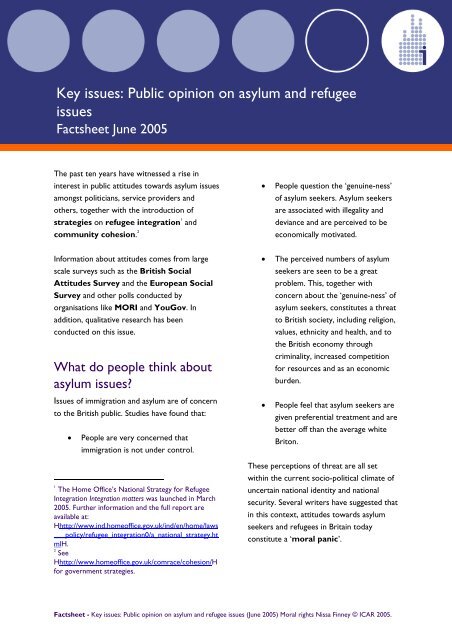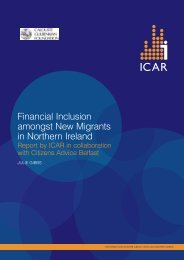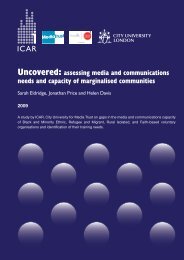Key issues: Public opinion on asylum and refugee issues - ICAR
Key issues: Public opinion on asylum and refugee issues - ICAR
Key issues: Public opinion on asylum and refugee issues - ICAR
You also want an ePaper? Increase the reach of your titles
YUMPU automatically turns print PDFs into web optimized ePapers that Google loves.
Anecdotal evidence suggests that generalisedhostility towards <strong>asylum</strong> seekers <strong>and</strong> <strong>refugee</strong>smay be compounded by other racial, religious<strong>and</strong> gender prejudices. <str<strong>on</strong>g>Public</str<strong>on</strong>g> <str<strong>on</strong>g>opini<strong>on</strong></str<strong>on</strong>g> maytherefore be particularly hostile to those<strong>refugee</strong>s <strong>and</strong> <strong>asylum</strong> seekers who are also, forexample, Black, Muslim, LGBT or Roma.C<strong>on</strong>siderable c<strong>on</strong>fusi<strong>on</strong>, ignorance <strong>and</strong>misinformati<strong>on</strong> exists about <strong>asylum</strong> <str<strong>on</strong>g>issues</str<strong>on</strong>g>.People in general have poor knowledge about<strong>asylum</strong> <strong>and</strong> immigrati<strong>on</strong> <str<strong>on</strong>g>issues</str<strong>on</strong>g> <strong>and</strong> there is aproblem of informati<strong>on</strong> provisi<strong>on</strong>. For example,in <strong>on</strong>e survey, <strong>on</strong> average people thought thatthe UK has 23% of the world’s <strong>refugee</strong>s. Theactual figure is closer to 2%. 3Many of the c<strong>on</strong>cerns expressed in the UK arecomm<strong>on</strong> to all western European countries.However, ‘there is a lower level of acceptancewhere <strong>refugee</strong>s <strong>and</strong> pers<strong>on</strong>s seeking political<strong>asylum</strong> are c<strong>on</strong>cerned’ 4 in Britain than elsewhere.What shapes our attitudes?There is general c<strong>on</strong>sensus in research that mosttolerant attitudes towards <strong>asylum</strong> seekers areassociated with youth, high socio-ec<strong>on</strong>omicstatus, high educati<strong>on</strong>al attainment <strong>and</strong> left wingpolitics. Where people live may also affect theirattitudes. Little is known about how ethnicity<strong>and</strong> religi<strong>on</strong> affect attitudes though someresearch indicates that there is a tendency forn<strong>on</strong>-white people to have higher <str<strong>on</strong>g>opini<strong>on</strong></str<strong>on</strong>g>s3MORI/Migrati<strong>on</strong> Watch UK (2003) British views <strong>on</strong>immigrati<strong>on</strong>. L<strong>on</strong>d<strong>on</strong>: MORI. Available atHhttp://www.mori.com/polls/2003/migrati<strong>on</strong>.shtmlH.4European M<strong>on</strong>itoring Centre <strong>on</strong> Racism <strong>and</strong>Xenophobia (2001:14) Attitudes towards minority groupsin the European Uni<strong>on</strong>. A special analysis of theEurobarometer 2000 Survey. Vienna: EUMC.<str<strong>on</strong>g>Key</str<strong>on</strong>g> work <strong>on</strong> attitudes towards<strong>asylum</strong> seekersCommissi<strong>on</strong> for Racial EqualityLiterature review (2005)Finney, N. with Peach, E. (forthcoming 2005)Literature review: Attitudes towards <strong>asylum</strong>seekers, <strong>refugee</strong>s <strong>and</strong> other immigrants.L<strong>on</strong>d<strong>on</strong>: Commissi<strong>on</strong> for Racial Equality.Hhttp://www.cre.gov.ukHAsylum <strong>and</strong> public attitudes researchby the Institute for <str<strong>on</strong>g>Public</str<strong>on</strong>g> PolicyResearch (2005)Lewis, M. (June 2005) Asylum: Underst<strong>and</strong>ingpublic attitudes. L<strong>on</strong>d<strong>on</strong>: IPPR.Hhttp://www.ippr.org.uk/publicati<strong>on</strong>s<strong>and</strong>reports/publicati<strong>on</strong>.asp?id=294H.PhD research (2004)Finney, N. (2004) ‘Asylum seeker dispersal:<str<strong>on</strong>g>Public</str<strong>on</strong>g> attitudes <strong>and</strong> press portrayals aroundthe UK’. PhD thesis, University of WalesSwansea.<strong>ICAR</strong>’s ‘Underst<strong>and</strong>ing the Stranger’programme (<strong>on</strong>going)D’Onofrio, L. <strong>and</strong> Munk, K. (2004)Underst<strong>and</strong>ing the stranger. Final report.L<strong>on</strong>d<strong>on</strong>: <strong>ICAR</strong>.Hhttp://www.icar.org.uk/pdf/uts003.pdfH.<strong>ICAR</strong>’s ‘Media Image, CommunityImpact programme’ (<strong>on</strong>going)<strong>ICAR</strong> (2004) Media image, community impact.Assessing the impact of media <strong>and</strong> politicalimages of <strong>refugee</strong>s <strong>and</strong> <strong>asylum</strong> seekers <strong>on</strong>community relati<strong>on</strong>s in L<strong>on</strong>d<strong>on</strong>. Report of a pilotresearch study. L<strong>on</strong>d<strong>on</strong>: <strong>ICAR</strong>.Hhttp://www.icar.org.uk/pdf/mici004.pdfH.Factsheet - <str<strong>on</strong>g>Key</str<strong>on</strong>g> <str<strong>on</strong>g>issues</str<strong>on</strong>g>: <str<strong>on</strong>g>Public</str<strong>on</strong>g> <str<strong>on</strong>g>opini<strong>on</strong></str<strong>on</strong>g> <strong>on</strong> <strong>asylum</strong> <strong>and</strong> <strong>refugee</strong> <str<strong>on</strong>g>issues</str<strong>on</strong>g> (June 2005) Moral rights Nissa Finney © <strong>ICAR</strong> 2005.
of recent immigrants, <strong>asylum</strong> seekers <strong>and</strong> ethnicminorities than white people.The c<strong>on</strong>tact hypothesis suggests that c<strong>on</strong>tactbetween members of different groups has thepotential to break down fears <strong>and</strong> anxieties <strong>and</strong>leads to greater underst<strong>and</strong>ing <strong>and</strong> tolerance.Research about newly arrived <strong>asylum</strong> seekersgenerally supports the noti<strong>on</strong> that individualc<strong>on</strong>tact improves community relati<strong>on</strong>s. Recenttheories suggest that encounters must have‘friendship potential’ if they are to result inpositive attitude change.Informati<strong>on</strong> sources that can influence whatpeople think about <strong>asylum</strong> <str<strong>on</strong>g>issues</str<strong>on</strong>g> include themedia, politicians, government <strong>and</strong> <strong>refugee</strong>organisati<strong>on</strong>s but also more informal, everydayexchanges between people.What role does the mediaplay?The British media has generally represented<strong>refugee</strong>s <strong>and</strong> <strong>asylum</strong> seekers in negative ways.There has been a repetitive use of certain terms<strong>and</strong> types of language. Asylum seekers aredescribed as a ‘flood’ or ‘wave’ <strong>and</strong> as ‘bogus’ or‘fraudulent’. Frequently, a ‘binary logic’ isdeployed setting, for example, bogus againstgenuine <strong>and</strong> legal against illegal.British news coverage of <strong>asylum</strong> <str<strong>on</strong>g>issues</str<strong>on</strong>g> has beencriticised for failing to provide c<strong>on</strong>text for thestories by not adequately explaining the reas<strong>on</strong>sfor <strong>asylum</strong> seekers’ flights to the UK <strong>and</strong> thec<strong>on</strong>diti<strong>on</strong>s of their journey <strong>and</strong> life <strong>on</strong> arrival,<strong>and</strong> for not giving a voice to the migrantsthemselves. However, recent research has foundthat the local press has produced someAsylum attitudes statistics• 28% of people identified <strong>asylum</strong> <strong>and</strong>immigrati<strong>on</strong> as an issue they wanted thepolitical parties to address.Source: Populus poll, February 2005discussed in ‘Opini<strong>on</strong> polls: scanning the<str<strong>on</strong>g>issues</str<strong>on</strong>g>’ by David Cowling 12 April 2005,available atHhttp://news.bbc.co.uk/2/hi/uk_news/politics/vote_2005/<str<strong>on</strong>g>issues</str<strong>on</strong>g>/4436891.stmH.• 85% of resp<strong>on</strong>dents feel that thegovernment does not have immigrati<strong>on</strong>under c<strong>on</strong>trol.Source: MORI/Migrati<strong>on</strong> Watch UK (2003)British views <strong>on</strong> immigrati<strong>on</strong>. L<strong>on</strong>d<strong>on</strong>: MORI.Available atHhttp://www.mori.com/polls/2003/migrati<strong>on</strong>.shtmlH.• 70% of people support allowing morepeople with skills that are in shortsupply here to come to Britain.Source: Guardian/ICM poll, discussed inTravis, A. <strong>and</strong> Blenford, A. (2001) ‘The waywe see it… <strong>and</strong> the way it is’ The Guardian:Welcome to Britain, 21.5.2001: 6-7.• 67% of people think that fewer than 25%of <strong>asylum</strong> seekers in Britain aregenuinely fleeing persecuti<strong>on</strong>.Source: YouGov Immigrati<strong>on</strong> <strong>and</strong> Asylumsurvey for The Sun, August 2003. Available atHhttp://www.yougov.com/archives/archivesPolitical.asp?sID=3&rID=2&wID=0&uIDH=Factsheet - <str<strong>on</strong>g>Key</str<strong>on</strong>g> <str<strong>on</strong>g>issues</str<strong>on</strong>g>: <str<strong>on</strong>g>Public</str<strong>on</strong>g> <str<strong>on</strong>g>opini<strong>on</strong></str<strong>on</strong>g> <strong>on</strong> <strong>asylum</strong> <strong>and</strong> <strong>refugee</strong> <str<strong>on</strong>g>issues</str<strong>on</strong>g> (June 2005) Moral rights Nissa Finney © <strong>ICAR</strong> 2005.
Asylum attitudes statistics• 45% of people agree that ‘<strong>asylum</strong> seekerswho are genuinely fleeing persecuti<strong>on</strong> shouldbe made welcome in Britain, even if theyhave arrived here illegally’.Source: YouGov Immigrati<strong>on</strong> <strong>and</strong> Asylum surveyfor The Sun, August 2003. Available atHhttp://www.yougov.com/archives/archivesPolitical.asp?sID=3&rID=2&wID=0&uIDH=.• 49% of people think immigrants havebenefited Britain’s ec<strong>on</strong>omy.very balanced, accurate <strong>and</strong>, at times,imaginative reporting <strong>on</strong> <strong>asylum</strong>. Morepers<strong>on</strong>alised <strong>and</strong> humanised stories are seenin the local press.However, echoing broader debates aboutthe role of the media in attitude formati<strong>on</strong>,the ways in which media reporting of<strong>asylum</strong> affects public <str<strong>on</strong>g>opini<strong>on</strong></str<strong>on</strong>g> is still thefocus of debate. The relati<strong>on</strong>ships <strong>and</strong>exchanges between media messages <strong>and</strong>their audiences are complex <strong>and</strong> multidirecti<strong>on</strong>al<strong>and</strong> more research is neededto underst<strong>and</strong> exactly how far <strong>and</strong> in whatways reporting affects attitudes.Source: as above.• 64% of people think immigrants havebenefited Britain’s culture.Source: as above.Research suggests that media coverage doesimpact <strong>on</strong> attitudes (<strong>and</strong> behaviour) towards<strong>asylum</strong> seekers, <strong>refugee</strong>s <strong>and</strong> immigrants butthe causal relati<strong>on</strong>ships are extremelycomplex <strong>and</strong> media messages are seen to be‘filtered’ by the audience.• On average people estimated that Britain has23% of the world’s <strong>refugee</strong>s (actually around2% at the time of the poll).Source: MORI/Migrati<strong>on</strong> Watch UK (2003) Britishviews <strong>on</strong> immigrati<strong>on</strong>. L<strong>on</strong>d<strong>on</strong>: MORI. Available atHhttp://www.mori.com/polls/2003/migrati<strong>on</strong>.shtmlH.<str<strong>on</strong>g>Key</str<strong>on</strong>g> factors that influence the nature ofmedia effects include the individual’spercepti<strong>on</strong> of the media source; theindividual’s prior knowledge <strong>and</strong> pers<strong>on</strong>alexperience of the <str<strong>on</strong>g>issues</str<strong>on</strong>g>; the prominence ofa message including its repetiti<strong>on</strong>; <strong>and</strong>whether the message reinforces orchallenges the individual’s existing attitudes.• 60% of people support <strong>and</strong> 24% of peopleopposed the C<strong>on</strong>servative Party’s 2005 proposalsto withdraw from the 1951 UN C<strong>on</strong>venti<strong>on</strong>.Source: YouGov/Mail <strong>on</strong> Sunday survey, February2005. Available atHhttp://www.yougov.com/archives/archivesPoliticIn the UK c<strong>on</strong>text, ‘agenda setting’, thedefiniti<strong>on</strong> of what <str<strong>on</strong>g>issues</str<strong>on</strong>g> are important tothe public <strong>and</strong> politicians, is thought to be<strong>on</strong>e of the media’s str<strong>on</strong>gest influences <strong>on</strong>public <str<strong>on</strong>g>opini<strong>on</strong></str<strong>on</strong>g>.al asp?sID=3&rID=2&wID=0&uIDH=Factsheet - <str<strong>on</strong>g>Key</str<strong>on</strong>g> <str<strong>on</strong>g>issues</str<strong>on</strong>g>: <str<strong>on</strong>g>Public</str<strong>on</strong>g> <str<strong>on</strong>g>opini<strong>on</strong></str<strong>on</strong>g> <strong>on</strong> <strong>asylum</strong> <strong>and</strong> <strong>refugee</strong> <str<strong>on</strong>g>issues</str<strong>on</strong>g> (June 2005) Moral rights Nissa Finney © <strong>ICAR</strong> 2005.
How can <str<strong>on</strong>g>opini<strong>on</strong></str<strong>on</strong>g>s be betterinformed?Many organisati<strong>on</strong>s have for several years beenworking for a more balanced <strong>and</strong> informeddebate about <strong>asylum</strong> <strong>and</strong> immigrati<strong>on</strong>, including<strong>ICAR</strong> <strong>and</strong> the major <strong>refugee</strong> organisati<strong>on</strong>s in theUK.Addressing negative <strong>and</strong> unbalanced mediacoverage of <strong>asylum</strong> has been identified by manyas a priority in creating more informed <str<strong>on</strong>g>opini<strong>on</strong></str<strong>on</strong>g>s.This can be d<strong>on</strong>e by challenging inaccurate mediaportrayals by complaining to the PressComplaints Commissi<strong>on</strong> <strong>and</strong> other mediaregulators. However, a more sustainableapproach may be to engage with the media towork towards more varied <strong>and</strong> positivecoverage. Training <strong>and</strong> supporting <strong>refugee</strong>organisati<strong>on</strong>s to work with the media is a criticalaspect of this.Although public <str<strong>on</strong>g>opini<strong>on</strong></str<strong>on</strong>g> is often highlymisinformed, people’s c<strong>on</strong>cerns should,nevertheless, be taken seriously. Researchsuggests that systems for resp<strong>on</strong>ding to thec<strong>on</strong>cerns of people affected by the arrival of<strong>asylum</strong> seekers should be developed <strong>and</strong>informati<strong>on</strong> provisi<strong>on</strong> should be made a keypart of <strong>asylum</strong> seeker <strong>and</strong> <strong>refugee</strong> settlementstrategies.Research suggests that increasing opportunitiesfor c<strong>on</strong>tact between groups can help to createmore informed <str<strong>on</strong>g>opini<strong>on</strong></str<strong>on</strong>g>s. Agencies could worktogether to encourage such situati<strong>on</strong>s <strong>and</strong>employers could develop a workplace culturethat fosters c<strong>on</strong>tact between groups.Asylum attitudes quotes‘I think <strong>on</strong> a local level in the villages thec<strong>on</strong>cern is that overnight there will be morethan double the populati<strong>on</strong> of the twovillages. Now [if that were] <strong>asylum</strong> seekers,or anybody else, that in itself would be lifechanging.’Community representative cited in D’Onofrio, L.<strong>and</strong> Munk, K. (2004) Underst<strong>and</strong>ing the stranger.Final report. L<strong>on</strong>d<strong>on</strong>: <strong>ICAR</strong>. Available atHhttp://www.icar.org.uk/pdf/uts003.pdfH.‘A lot of them are criminals, you’ve <strong>on</strong>ly gotto read about these Albanians who arerunning prostituti<strong>on</strong> rackets in L<strong>on</strong>d<strong>on</strong>…alot of crime is perpetrated by <strong>asylum</strong>seekers I should imagine.’Local resident cited in Finney, N. (2004) ‘Asylumseeker dispersal: <str<strong>on</strong>g>Public</str<strong>on</strong>g> attitudes <strong>and</strong> pressportrayals around the UK’. PhD thesis, Universityof Wales Swansea.‘They are getting thous<strong>and</strong>s of pounds forcars, they get mobiles, they getcomputers…they get everything. But like,you see, me <strong>and</strong> [friend] we’re both singleparents so if we go to get anything, we can’tget it…That’s what gets a lot of people’sbacks up.’Local resident cited in D’Onofrio, L. <strong>and</strong> Munk,K. (2004) Underst<strong>and</strong>ing the stranger. Final report.L<strong>on</strong>d<strong>on</strong>: <strong>ICAR</strong>. Available atHhttp://www.icar.org.uk/pdf/uts003.pdfH.An <strong>ICAR</strong> report for the CRE c<strong>on</strong>cluded that forattitudes initiatives to be successful six keycriteria should be c<strong>on</strong>sidered: the precise aims,Factsheet - <str<strong>on</strong>g>Key</str<strong>on</strong>g> <str<strong>on</strong>g>issues</str<strong>on</strong>g>: <str<strong>on</strong>g>Public</str<strong>on</strong>g> <str<strong>on</strong>g>opini<strong>on</strong></str<strong>on</strong>g> <strong>on</strong> <strong>asylum</strong> <strong>and</strong> <strong>refugee</strong> <str<strong>on</strong>g>issues</str<strong>on</strong>g> (June 2005) Moral rights Nissa Finney © <strong>ICAR</strong> 2005.
Asylum attitudes quotes‘Any civilised country would welcome <strong>asylum</strong>seekers… the tabloids <strong>and</strong> people who say thereare too many <strong>asylum</strong> seekers d<strong>on</strong>’t appreciatethe types of things they’re running away from.’Local resident cited in Finney, N. (2004) ‘Asylumseeker dispersal: <str<strong>on</strong>g>Public</str<strong>on</strong>g> attitudes <strong>and</strong> press portrayalsaround the UK’. PhD thesis, University of WalesSwansea.‘Any time there is anything in the media,subsequently there are follow-ups – there areincidents.’Community representative cited in <strong>ICAR</strong> (2004) Mediaimage, community impact. Assessing the impact of media<strong>and</strong> political images of <strong>refugee</strong>s <strong>and</strong> <strong>asylum</strong> seekers <strong>on</strong>community relati<strong>on</strong>s in L<strong>on</strong>d<strong>on</strong>. Report of a pilot researchstudy. L<strong>on</strong>d<strong>on</strong>: <strong>ICAR</strong>. Available atHhttp://www.icar.org.uk/pdf/mici004.pdfH.‘I saw a group of boys…the oldest was about ten.They gathered st<strong>on</strong>es <strong>and</strong> began to throw themat me…I started to run away from them but thatdidn’t stop them.’Refugee cited in Temple, B., Moran, R. et alLearning to live together: developing communitieswith dispersed <strong>refugee</strong> people seeking <strong>asylum</strong>. York:Joseph Rowntree Foundati<strong>on</strong>. Available atHhttp://www.jrf.org.uk/knowledge/findings/socialpolicy/0085.aspH.the target audience, the theories ofattitude change up<strong>on</strong> which to base thedesign of the initiative, the appropriategeographical <strong>and</strong> time scales, themedia relati<strong>on</strong>s strategy to beemployed, <strong>and</strong> how the initiative will beevaluated. It is important that any efforts<strong>and</strong> resources devoted to creating moreinformed <str<strong>on</strong>g>opini<strong>on</strong></str<strong>on</strong>g>s <strong>on</strong> <strong>asylum</strong> are notwasted through poorly planned <strong>and</strong>implemented initiatives.Similarly, a Joseph Rowntree Foundati<strong>on</strong>report c<strong>on</strong>cluded that projects that mostsuccessfully challenged prejudice had welldefined objectives; a clear structure; arange of facilitators, presenters <strong>and</strong>activities; sustained activities over aperiod of time; reflecti<strong>on</strong> <strong>on</strong> pers<strong>on</strong>alattitudes <strong>and</strong> experiences; <strong>and</strong> learningthrough doing <strong>and</strong> experiencing not justtalking. 55HLemos, G. (2005) The search for tolerance:Challenging <strong>and</strong> changing racist attitudes <strong>and</strong>behaviour in young people. York: Joseph RowntreeFoundati<strong>on</strong>. Available atHhttp://www.jrf.org.uk/knowledge/findings/socialpolicy/0135.aspH.HFactsheet - <str<strong>on</strong>g>Key</str<strong>on</strong>g> <str<strong>on</strong>g>issues</str<strong>on</strong>g>: <str<strong>on</strong>g>Public</str<strong>on</strong>g> <str<strong>on</strong>g>opini<strong>on</strong></str<strong>on</strong>g> <strong>on</strong> <strong>asylum</strong> <strong>and</strong> <strong>refugee</strong> <str<strong>on</strong>g>issues</str<strong>on</strong>g> (June 2005) Moral rights Nissa Finney © <strong>ICAR</strong> 2005.
Further readingA full discussi<strong>on</strong> of these <str<strong>on</strong>g>issues</str<strong>on</strong>g> <strong>and</strong> c<strong>on</strong>cepts canbe found in the Navigati<strong>on</strong> guide to public<str<strong>on</strong>g>opini<strong>on</strong></str<strong>on</strong>g> <strong>on</strong> <strong>asylum</strong> <strong>and</strong> <strong>refugee</strong> <str<strong>on</strong>g>issues</str<strong>on</strong>g>,available athttp://www.icar.org.uk/res/nav/keyiss.html.The navigati<strong>on</strong> guide features a full list ofresources <strong>and</strong> projects. Additi<strong>on</strong>al key readingsto those featured <strong>on</strong> page <strong>on</strong>e are listed below.Article 19 (2003) What’s the story? Results fromresearch into media coverage of <strong>refugee</strong>s <strong>and</strong> <strong>asylum</strong>seekers in the UK. L<strong>on</strong>d<strong>on</strong>: Article 19.Barclay, A., Bowes, A., Fergus<strong>on</strong>, I., Sim, D., Valenti,M., Fard, S., <strong>and</strong> MacIntosh, S. (2003) Asylum seekers inScotl<strong>and</strong>. Edinburgh: Scottish Executive SocialResearch. Available athttp://www.scotl<strong>and</strong>.gov.uk/library5/social/asis-00.asp.Lemos, G. (2005) The search for tolerance:Challenging <strong>and</strong> changing racist attitudes <strong>and</strong>behaviour in young people. York: Joseph RowntreeFoundati<strong>on</strong>. Available athttp://www.jrf.org.uk/knowledge/findings/socialpolicy/0135.asp.Temple, B., Moran, R. et al Learning to livetogether: developing communities with dispersed<strong>refugee</strong> people seeking <strong>asylum</strong>. York: JosephRowntree Foundati<strong>on</strong>. Available athttp://www.jrf.org.uk/knowledge/findings/socialpolicy/0085.asp.Valentine, G. <strong>and</strong> McD<strong>on</strong>ald, I. for St<strong>on</strong>ewall(2004) Underst<strong>and</strong>ing prejudice. Attitudes towardsminorities. L<strong>on</strong>d<strong>on</strong>: St<strong>on</strong>ewall. Available athttp://www.st<strong>on</strong>ewall.org.uk/docs/Underst<strong>and</strong>ing_Prejudice.pdf.Clark, A. (2004) The reporting <strong>and</strong> recording of racistincidents against <strong>asylum</strong> seekers in the North East ofEngl<strong>and</strong>. Newcastle: University of Northumbria.Available athttp://<strong>on</strong>line.northumbria.ac.uk/csru/pdfs/NECARS_report.pdf.Author of factsheet: Nissa FinneyHewitt, R.L. (2002) Asylum seeker dispersal <strong>and</strong>community relati<strong>on</strong>s – An analysis of developmentstrategies. L<strong>on</strong>d<strong>on</strong>: Goldsmith’s College, University ofL<strong>on</strong>d<strong>on</strong>.Holl<strong>and</strong>s, M. (2001) ‘Up<strong>on</strong> closer acquaintance: theimpact of direct c<strong>on</strong>tact with <strong>refugee</strong>s <strong>on</strong> Dutchhosts’ Journal of Refugee Studies 14(3): 295-314.Factsheet - <str<strong>on</strong>g>Key</str<strong>on</strong>g> <str<strong>on</strong>g>issues</str<strong>on</strong>g>: <str<strong>on</strong>g>Public</str<strong>on</strong>g> <str<strong>on</strong>g>opini<strong>on</strong></str<strong>on</strong>g> <strong>on</strong> <strong>asylum</strong> <strong>and</strong> <strong>refugee</strong> <str<strong>on</strong>g>issues</str<strong>on</strong>g> (June 2005) Moral rights Nissa Finney © <strong>ICAR</strong> 2005.
















